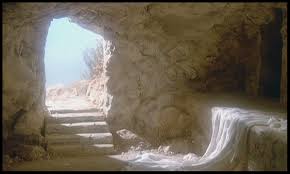
When Christ was looking for disciples to spread his light, the ones he chose weren’t the brightest bulbs. He often told them things three times and they still didn’t understand. The most important thing he taught was that he had to die a horrible death and then rise from the dead. Yet, as John tells us in his gospel, they didn’t really get it until they saw his empty tomb. If they had understood what their master was telling them those three times, they would have found a hiding place near Jesus’ tomb after he was buried and waited three days so they could see his prediction come true. But as John tells us, they had to hear the good news from Mary Magdalene before John and Peter would race to the scene for their Aha! Moment. Then, as John’s account of Peter’s reaction states (Jn 20:1-9) …
… he saw and believed. For they did not yet understand the Scripture that he had to rise from the dead.
Once they did get it, Matthew, Mark and Luke proceeded to tell the rest of us about those three times Jesus told them what was about to happen. So that makes nine times the synoptic gospels tell us what Jesus told them about why we celebrate something called Easter. Of course, the Acts of the Apostles prove the disciples were finally motivated by both Spirit and Truth, and Peter—the triple-denier in chief—started obeying his Master’s thrice-stated command to feed his sheep. In Sunday’s excerpt from Acts (Acts 10:34a, 37-43), Peter explains for us in a few sentences the mission that once seemed impossible for him to understand.
This man God raised on the third day and granted that he be visible, not to all the people, but to us, the witnesses chosen by God in advance, who ate and drank with him after he rose from the dead. He commissioned us to preach to the people and testify that he is the one appointed by God as judge of the living and the dead.
Of course, who could be better than Paul, the former persecutor of people who believed this stuff, at helping the rest of the world’s non-believers understand that what happened to Jesus represents our own hope for rising above our earthbound intellects (Col 3:1-4)?
Brothers and sisters: If then you were raised with Christ, seek what is above, where Christ is seated at the right hand of God. Think of what is above, not of what is on earth. For you have died, and your life is hidden with Christ in God.
Most of us have heard this Easter message of dying to earthly things and rising to God’s expectations many more times than Christ’s original disciples did. But we’re dumb enough to, like them, ignore its simplicity—or even worse, to raise our ignorance quotient by equating it with the mission of an egg-bearing bunny. If we want to pretend for Easter, let’s pretend we’re John—said to be Jesus’ favorite disciple—and, upon seeing his best friend’s empty tomb, proceed to live that good news for all to see and believe.
–Tom Andel